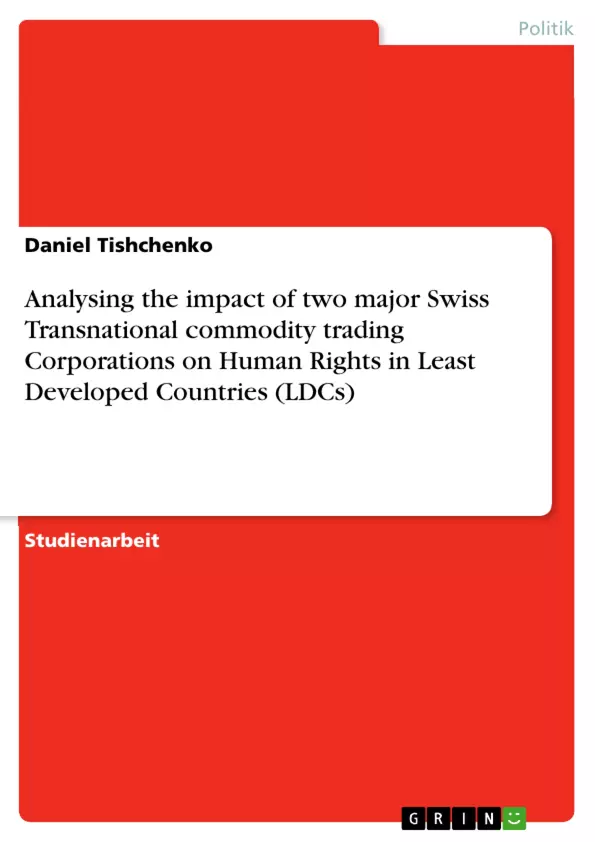The main objective of this paper is to analyze the Human Rights practices and policies in developing countries of two Transnational commodity trading corporations (Glencore AG and Trafigura AG) headquartered in Switzerland through the companies’ Corporate Social Responsibility Reports (CSR) and then try to find solutions to ensure its compliance. In the last few years, several Swiss Corporations operating in the commodity trading sector have been directly or indirectly implicated in several scandals related to violation of Human Rights in different developing countries rich in raw materials. The analysis of the two companies’ official reports showed that there is a great commitment to respect Human Rights in their business process in order to align with the requirements and criteria of the UN and various organizations sensitive to social issues. However, relying solely on the trust of the Transnational Corporations is certainly not enough because there will always be agents who do not take the Human Rights issue into consideration. Therefore, there must be a coercive force acting internationally to punish guilds that commit Human Rights abuses in all the countries in the world, something that unfortunately does not happen today.
Inhaltsverzeichnis
- 1. Introduction
- 2. Context and general overview.
- 2.1 Commodity Trading Sector in Switzerland
- 2.2 UN Guiding Principles on Business Humans Rights.....
- 3. Case Study: Analysis of two Swiss Commodity Trading Corporations on Human Rights Practices
- 3.1. Methodology...
- 3.2. Glencore Holding AG Case
- 3.3. Trafigura Groupe Pte. Ltd..
- 3.4. General comment on the analysis
- 4. Recommendations to ensure the respect for Human Rights in least developed countries ....
- 4.1. International perspective.
- 5. Conclusion
Zielsetzung und Themenschwerpunkte
Diese Arbeit analysiert die Menschenrechtspraktiken und -richtlinien von zwei in der Schweiz ansässigen transnationalen Rohstoffhandelsunternehmen (Glencore AG und Trafigura AG) in Entwicklungsländern. Die Analyse basiert auf den Berichten der Unternehmen zur sozialen Verantwortung (CSR). Das Ziel ist es, Lösungen zu finden, um die Einhaltung von Menschenrechten durch diese Unternehmen zu gewährleisten.
- Der Rohstoffhandelssektor in der Schweiz
- Die UN-Leitprinzipien für Wirtschaft und Menschenrechte
- Die Menschenrechtspraktiken von Glencore AG und Trafigura AG in Entwicklungsländern
- Empfehlungen zur Gewährleistung der Achtung der Menschenrechte in den am wenigsten entwickelten Ländern
- Die Rolle internationaler Akteure bei der Durchsetzung von Menschenrechten
Zusammenfassung der Kapitel
Das erste Kapitel bietet eine Einführung in das Thema und stellt die Problemstellung dar. Es beleuchtet die Rolle von Schweizer Rohstoffhandelsunternehmen in Entwicklungsländern und die Herausforderungen in Bezug auf die Einhaltung von Menschenrechten. Das zweite Kapitel stellt den Kontext und die relevanten Rahmenbedingungen vor. Es analysiert den Schweizer Rohstoffhandelssektor und die UN-Leitprinzipien für Wirtschaft und Menschenrechte. Das dritte Kapitel präsentiert eine Fallstudie, die sich auf die Analyse der Menschenrechtspraktiken von Glencore AG und Trafigura AG konzentriert. Es untersucht die jeweiligen CSR-Berichte der Unternehmen und bewertet deren Einhaltung von Menschenrechtsstandards. Das vierte Kapitel bietet Empfehlungen zur Verbesserung der Menschenrechtslage in Entwicklungsländern. Es beleuchtet die Rolle internationaler Akteure und die Notwendigkeit von stärkeren Mechanismen zur Durchsetzung von Menschenrechten.
Schlüsselwörter
Transnationale Rohstoffhandelsunternehmen, Menschenrechte, Entwicklungsländer, CSR-Berichte, UN-Leitprinzipien für Wirtschaft und Menschenrechte, internationale Zusammenarbeit, Durchsetzung von Menschenrechten.
Häufig gestellte Fragen
Wie beeinflussen Schweizer Rohstoffhändler die Menschenrechte in Entwicklungsländern?
Die Arbeit analysiert, dass Unternehmen wie Glencore und Trafigura zwar CSR-Berichte veröffentlichen, es jedoch in der Vergangenheit immer wieder zu Skandalen und Menschenrechtsverletzungen in rohstoffreichen Ländern kam.
Was sind die UN-Leitprinzipien für Wirtschaft und Menschenrechte?
Es handelt sich um internationale Kriterien, die Unternehmen dazu verpflichten, Menschenrechte in ihren globalen Geschäftsprozessen zu achten und negative Auswirkungen zu minimieren.
Reichen freiwillige CSR-Berichte aus?
Die Analyse zeigt, dass Vertrauen allein nicht genügt, da wirtschaftliche Interessen oft über soziale Belange gestellt werden. Es wird eine internationale Zwangsgewalt zur Bestrafung von Verstößen gefordert.
Welche Rolle spielt die Schweiz im globalen Rohstoffhandel?
Die Schweiz ist ein bedeutender globaler Hub für den Rohstoffhandel, weshalb die dort ansässigen Unternehmen eine besondere Verantwortung für globale Menschenrechtsstandards tragen.
Was sind LDCs (Least Developed Countries)?
LDCs sind die am wenigsten entwickelten Länder, die oft reich an Rohstoffen, aber gleichzeitig besonders anfällig für Menschenrechtsmissbrauch durch transnationale Konzerne sind.
- Quote paper
- Daniel Tishchenko (Author), 2018, Analysing the impact of two major Swiss Transnational commodity trading Corporations on Human Rights in Least Developed Countries (LDCs), Munich, GRIN Verlag, https://www.grin.com/document/449784



